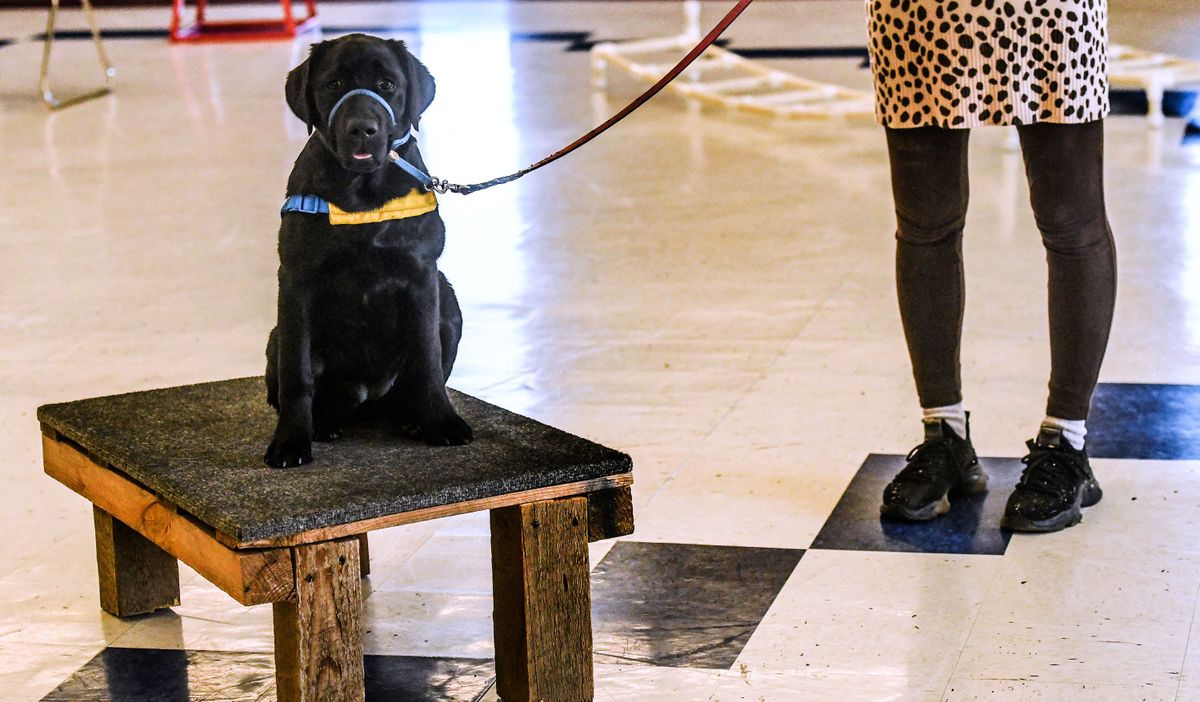Volunteers needed to train service dogs in Spokane: ‘It gives someone independence they never had’

Five-month-old Jolene wore a Canine Companions’ vest to her recent class in Sandpoint. The Labrador-golden retriever puppy had only a few lapses of attention, as a beginner.
The puppy’s 1-year-old classmate, Finnegan, proved more sure-pawed. He’s done weekly training as a future service dog since May. Finnegan kept a constant watch on the face of his handler, Lena Lund, who also is what Canine Companions calls a “puppy raiser.”
Since 1975, Canine Companions has provided more than 7,400 service dogs without charge to children, adults and veterans with disabilities. An Inland Northwest chapter is seeking to recruit more volunteers – especially in Spokane – as puppy raisers willing to offer dog care and training for about 15 months. The volunteers agree to pay for dog food, supplies and vet care during that stay.
Finnegan likely will return in August to Canine Companions’ headquarters in Santa Rosa, California, for final training and a potential match with a disabled owner.
Lund, a Sandpoint resident, said she expects it will be tough to let him go, but it’s for a good cause.
“It’s rewarding to do this, because these dogs are just amazing – how they’re bred and trained – they learn so fast,” Lund said. “They’re going to serve some person who needs a dog, so I think it’s great.”
Jolene’s temporary family includes mom Chika Orton, who said her eldest daughter had long asked for a puppy, but then they learned Canine Companions needed volunteers.
“We thought that it’s a good opportunity for her to learn how to have a pet, not just having a pet, but all the responsibilities,” said Orton, whose family is learning through the nonprofit’s dog training program. “Then my daughter feels good afterward because we’re helping somebody when we give the dog away.”
Lilly Mitsui, an Inland Northwest chapter leader who lives in Sagle, Idaho, has raised six puppies for Canine Companions, and the next one is expected this week. Mitsui said she sees untapped potential to grow the chapter with Spokane members, and there’s a need – the city’s volunteer force right now is smaller than in neighboring North Idaho communities.
“We currently have a blizzard of puppies that have been born or will be arriving over the next few months,” said Mitsui, who added that the nonprofit slowed operations during the pandemic but has resumed programs. The Inland Northwest chapter was formed in 2018 and covers Eastern Washington, North Idaho and western Montana.
Mitsui first became involved in 1995 in the Seattle area. Today, she and her husband stay in touch with people now served by the canines previously in the couple’s care.
“We have a family from San Francisco visiting us in June, and she has a dog I raised,” Mitsui said. “I think she had a stroke around age 30 and lost feeling on one side of her body. They have two kids and they’re coming up to spend a week with us.”
Another dog she raised became a hearing dog and went to a woman who was in her 40s.
“When we met, she burst into tears. They’re so grateful. It gives someone independence they never had,” Mitsui said.
She said the nonprofit has an award-winning breeding program for Labrador retrievers, golden retrievers and Lab-golden crosses to become potential service dogs.
In Sandpoint at a school’s indoor gym, the puppies followed commands to sit quietly next to a chair, go under objects and cross different surfaces. They had to sit without paying attention to the other canine as their handlers greeted each other.
“We work with over 60 disabilities, including PTSD,” Mitsui said. “The PTSD dogs are amazing. It’s a rather new program. They’re taught to do nightmare interruption, switch on the light, pull the cover off and lie across the person to calm them down and wake them up.”
A Canine Companions puppy arrives to be with a volunteer at 8 weeks old. The puppy raiser’s job is to teach basic obedience skills, socialize the puppy, and offer love and support, Mitsui added. She’s had families take on the project, as well as many people who are retired.
Canine Companions provides online training classes, an in-depth training manual and in-person classes. Future training could be held in Spokane, if enough families sign up, she said. Another chapter leader and trainer is Bonnie Wakefield, who lives in Spokane.
At about 16 to 17 months old, the young dogs return to Santa Rosa for final training by professionals. If that goes well, the dogs are matched with a new owner at a graduation ceremony, also when a volunteer puppy raiser is invited to come and present the pup to the new family.
The service dogs are trained to perform a limited set of practical tasks geared toward assisting individuals with physical disabilities or veterans with PTSD.
Some of the tasks they are trained to do include to retrieve and deliver dropped items, tug to open a door or drawer, pull a laundry basket or help with a sock or jacket, push with their nose to shut a drawer, open a door with an automatic push button, and turn lights on and off.
The service dogs who help someone who is deaf or hearing impaired are trained to alert recipients to sounds.
Canine Companions has 54 chapters across the U.S. and six regional training centers.